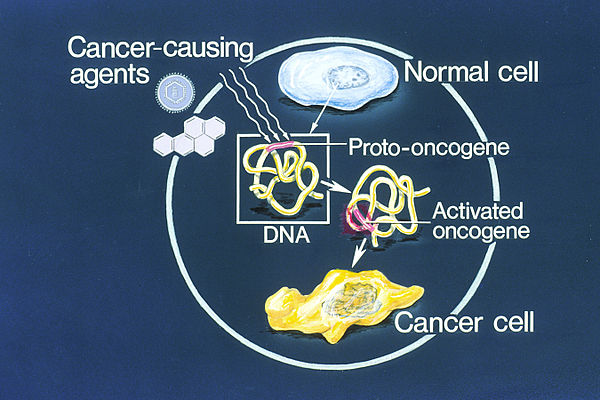Cancer-causing Mutations of a Proto-oncogene Cause Which of the Following
The activated proto-oncogene is called an oncogene. Point mutations gene amplification and chromosomal translocations produce oncogenes.

10 4a Proto Oncogenes Biology Libretexts
ScienceBiologyQA LibrarydTo cause cancer proto-oncogenes require 1 or 2alleles to be mutated and therefore are considered dominant or recessive.

. A causes cells to reduce expression of genes involved in DNA repair. Some mutations prevent the cell from reproducing which keeps the mutations from being passed on. Tumor-suppressor genes normally produce factors that stimulate cell division and mutations are usually recessive acting.
Proto-oncogenes are a group of genes that cause normal cells to become cancerous when they are mutated Adamson 1987. Why does cancer affect older individuals more frequently than younger people. E One of the earliest clues to understanding cancer was the discovery of.
In this case the mutation in the Ras is a GTP-binding protein convert it to an oncogene that stimulates the cell proliferation mechanism. They are important for regulating a variety of cellular processes. Growth factors are naturally occurring substances usually a protein or steroid hormone capable of stimulating cellular growth proliferation and differentiation.
Individuals who are heterozygous for a tumor-suppressor gene. C allows cells to pass on mutations due to DNA damage. D inhibits the cell cycle.
Are less likely to develop cancer because the tumor is homozygous. Mutation of one proto-oncogene allele in the pair can cause cancers. Therefore oncogenes exhibit an aggressive behavior.
For each underlined pair boldface one. The prognosis of GC is dismal in Western countries due to late diagnosis. If they were toxic ancient leftovers they would be taken out of the genome through evolution or deed that intact proto uncle genes are actually important in the cell and play a role and healthy cell division.
Worldwide gastric cancer GC is the fifth most common cancer and accounts for 7 of the total cancer incidence. Cancer arises most often when a series of mutations in proto-oncogenes causing them to become oncogenes and tumor suppressor genes results in a cell growing uncontrollably and unchecked. Which of the following best describes potential cancer causing mutations.
The mutation results in a loss or gain of function. D A mutation in a tumor-suppressor gene can stop cell division immediately. The protooncogenes are genes capable of causing cancer when they are activated to oncogenes by mutations that dysregulate their functions.
An important difference between oncogenes and tumor suppressor genes is that oncogenes result from the. GC may occur sporadically as a familial disease or as a hereditary disease. But mutations in the proto oncogenes conform uncle genes which are carcinogenic.
Biology questions and answers. C A mutation must occur in a cells DNA for a proto-oncogene to become an oncogene. When something goes wrong with the gene such as a mutation cell division can get out of control.
Of mutations that can cause a proto-oncogene to become an oncogene. Mutations may cause proto-oncogenes to become oncogenes disrupting normal cell division and causing cancers to form. Chromosomal rearrangements can lead to hematologic malignancy via two different mechanisms.
This mutation alters inserts or deletes one or more nucleotides building blocks of DNA and RNA in a gene. Proto-oncogenes normally produce factors that inhibit cell division and mutations are usually dominant acting. Cells become more fragile and die more rapidly as people age.
Older people tend to smoke which is a carcinogen and causes cancer. If a mutated cell is able to reproduce because the cell division. The product of the p53 gene _____.
Older people have more genes than younger people so the tendency for the genes to be mutated increases. B Many proto-oncogenes code for growth factors. Approximately 70 of the patients die within 5 years following initial diagnosis.
Proto- oncogenes positively regulate the cell cycle. A tumor suppressor gene is like the brake pedal on a car. 1 the transcriptional activation of protooncogenes or 2 the.
It normally keeps the cell from dividing too quickly just as a brake keeps a car from going too fast. 3 The development of cancer however is much easier to understand by looking at the different steps and lack of regulation that occurs over time. So not be that they are toxic ancient leftovers again.
B slows down the rate of DNA replication by interfering with the binding of DNA polymerase. Are more likely to develop cancer because only a single mutation is needed. A Proto-oncogenes are normal genes with the potential to become oncogenes.
The elevated amounts of gene products due to mutation cause excessive signals. A mutation in a proto-oncogene that will cause increase in the expression of the proto-oncoprotein oncoprotein A translocation chromosomal rearrangement that causes loss of a tumor suppressor gene A chromosomal rearrangement that causes amplification multiple copies of a tumor suppressor gene All of the above. Mutations that lead to cancer can occur in.
All of the above. Several Mutations to Cause Cancer Oncogenes may be growth factors protein kinases GTPases or transcription factors.
Health Science Academy Licensed For Non Commercial Use Only Chapter 14 Blog Mutation Dna Repair And Cancer Pankhuri
Cancer Causing Mutations Cell Biology Flashcards Draw It To Know It

0 Response to "Cancer-causing Mutations of a Proto-oncogene Cause Which of the Following"
Post a Comment